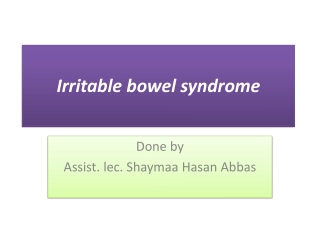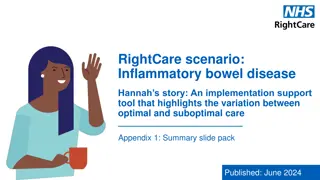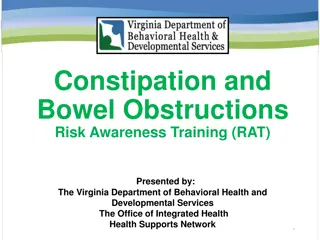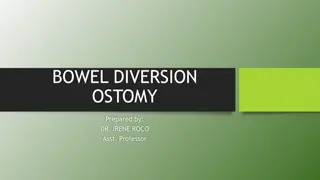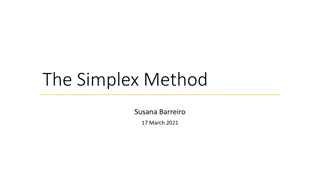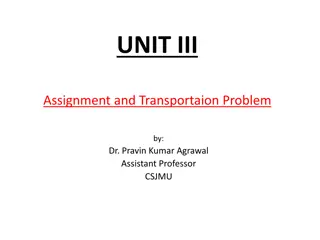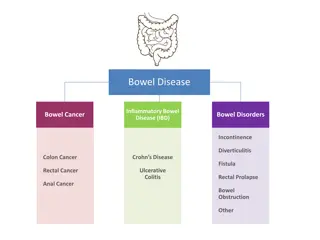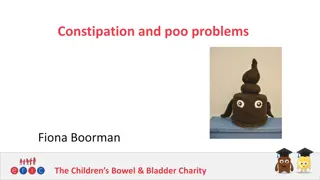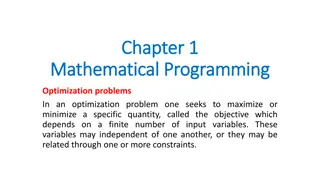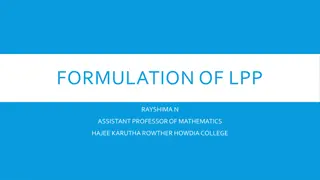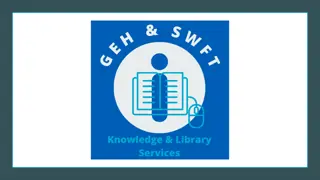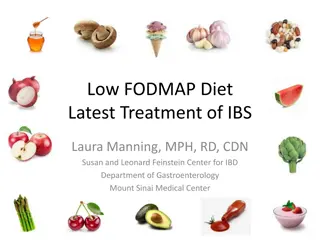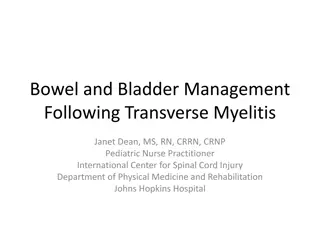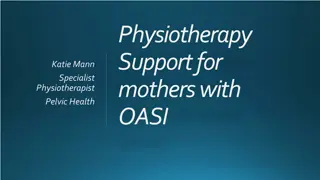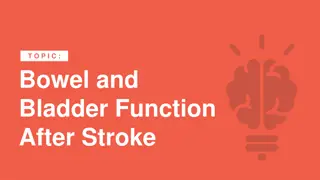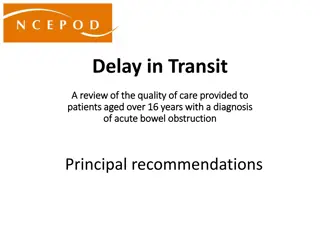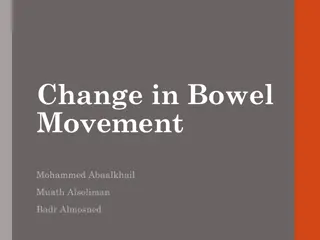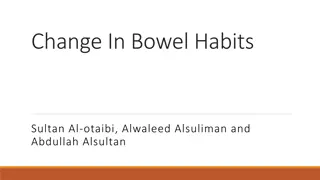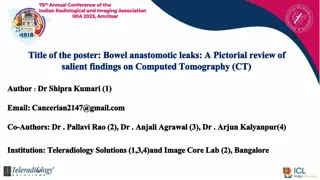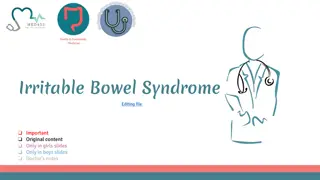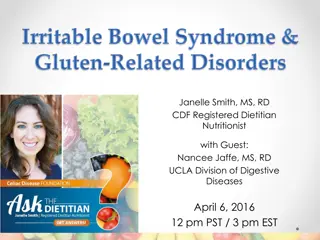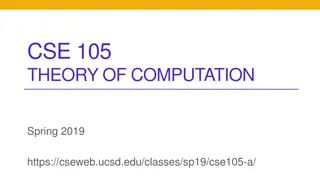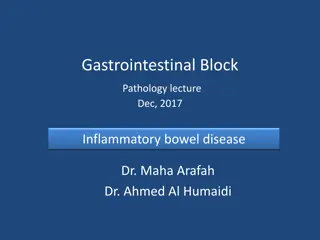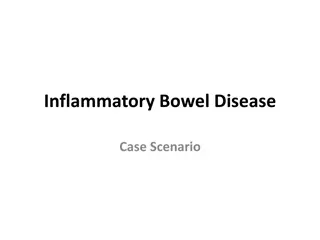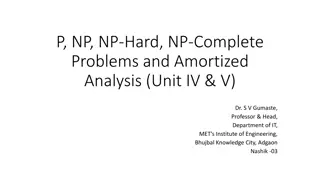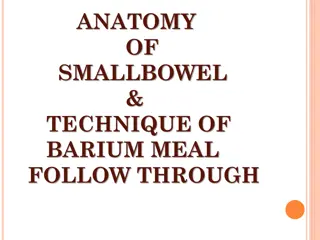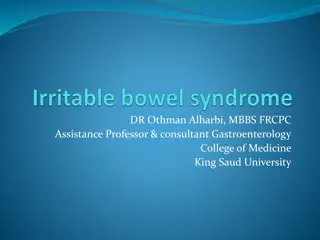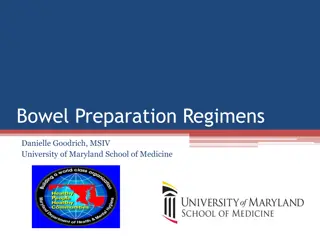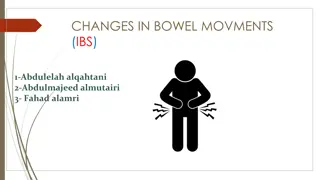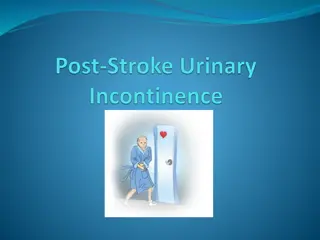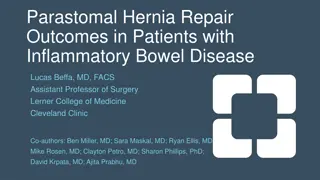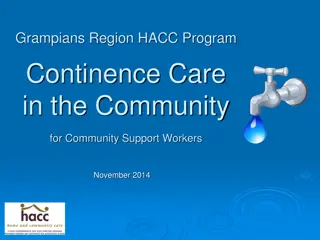Irritable bowel syndrome
Information on the aims of treatment, aggravating factors, treatment timescale, and non-drug and drug treatment options for irritable bowel syndrome (IBS). It also includes a list of relevant medications and their effects.
16 views • 39 slides
Understanding the Formulation of Hypothesis and Research Problem Definition
Research problems arise from situations requiring solutions, faced by individuals, groups, organizations, or society. Researchers define research problems through questions or issues they aim to answer or solve. Various sources such as intuitions, research studies, brainstorming sessions, and consul
5 views • 25 slides
Hannah's Struggle with Inflammatory Bowel Disease: A Journey of Challenges and Lessons
Hannah, a vibrant young woman with a bustling social life and active routines, experiences a series of setbacks in her battle with Inflammatory Bowel Disease (IBD). Her journey highlights the importance of timely diagnosis, access to proper care, and comprehensive support services to manage the cond
0 views • 9 slides
Understanding Constipation and Bowel Obstructions Risk
This training program by The Virginia Department of Behavioral Health and Developmental Services focuses on defining constipation, identifying causes and complications, recognizing bowel obstructions, and understanding signs and symptoms of fecal impaction. Caregiver recommendations and the roles of
0 views • 26 slides
Understanding Bowel Diversion Ostomy: Definition, Classification, and Management
Bowel diversion ostomy involves creating an opening in the gastrointestinal tract to divert and drain fecal material. This summary covers the definition, purpose, classification (permanent vs. temporary ostomies, types of intestinal ostomies), management, assessment, and changes associated with osto
0 views • 14 slides
Understanding The Simplex Method for Linear Programming
The simplex method is an algebraic procedure used to solve linear programming problems by maximizing or minimizing an objective function subject to certain constraints. This method is essential for dealing with real-life problems involving multiple variables and finding optimal solutions. The proces
0 views • 56 slides
Linear Programming Models for Product-Mix Problems and LP Problem Solutions
This unit covers the formulation of linear programming (LP) models for product-mix problems, including graphical and simplex methods for solving LP problems along with the concept of duality. It also delves into transportation problems, offering insights into LP problem resolution techniques.
0 views • 137 slides
Learning Objectives in Mathematics Education
The learning objectives in this mathematics course include identifying key words, translating sentences into mathematical equations, and developing problem-solving strategies. Students will solve word problems involving relationships between numbers, geometric problems with perimeter, percentage and
0 views • 30 slides
Understanding Bowel Diseases and Their Management
Understanding the causes and mechanisms of bowel diseases such as inflammatory bowel disease (IBD), bowel cancer, diverticulitis, Crohn's disease, and more is crucial for effective treatment. Genetic predisposition, environmental factors, immune malfunction, age-related issues, and lifestyle choices
0 views • 5 slides
Understanding Constipation and Poo Problems in Children
This resource provides insightful information on constipation and related issues in children, including causes, symptoms, treatments, and the impact on bowel and bladder health. It covers various topics such as bowel actions, medications, normal bowel function, and the significance of recognizing an
0 views • 21 slides
Introduction to Mathematical Programming and Optimization Problems
In optimization problems, one aims to maximize or minimize an objective based on input variables subject to constraints. This involves mathematical programming where functions and relationships define the objective and constraints. Linear, integer, and quadratic programs represent different types of
0 views • 25 slides
Examples of Optimization Problems Solved Using LINGO Software
This content provides examples of optimization problems solved using LINGO software. It includes problems such as job assignments to machines, finding optimal solutions, and solving knapsack problems. Detailed models, constraints, and solutions are illustrated with images. Optimization techniques an
1 views • 41 slides
Formulation of Linear Programming Problems in Decision Making
Linear Programming is a mathematical technique used to optimize resource allocation and achieve specific objectives in decision-making. The nature of Linear Programming problems includes product-mix and blending problems, with components like decision variables and constraints. Various terminologies
1 views • 14 slides
Understanding Bowel Cancer: Facts, Prevention, and Awareness Efforts
Bowel cancer, also known as colorectal cancer, is a significant health concern, being the fourth most common cancer in the UK. It is essential to be aware of the symptoms, risk factors, and preventive measures associated with this condition. By maintaining a healthy diet, managing body weight, and s
0 views • 9 slides
Understanding Functional GI Disorders: A Comprehensive Overview
Functional GI disorders encompass a range of conditions affecting the gastrointestinal system, such as irritable bowel syndrome and disorders of the gut-brain interaction. These disorders are characterized by no structural abnormalities but are influenced by factors like motility disturbance, viscer
0 views • 42 slides
Understanding the Low FODMAP Diet for Managing IBS
Irritable Bowel Syndrome (IBS) is a common condition that affects millions of people, with symptoms like abdominal pain, bloating, and altered bowel habits. The Low FODMAP diet is a promising approach to managing IBS by reducing certain types of carbohydrates that can trigger symptoms. This diet inv
0 views • 53 slides
Engaging Mathematics Problems for Critical Thinking and Fun Learning
Explore a collection of engaging mathematics problems and classical brain teasers that challenge students to think critically, problem-solve creatively, and have fun while learning. From dissection tasks to card dealing challenges, these problems encourage students to readjust, reformulate, and exte
0 views • 36 slides
Bowel and Bladder Management Post Transverse Myelitis
Following transverse myelitis, there can be significant changes in bowel and bladder function, impacting storage, release, and coordination. Neurogenic bowel and bladder issues, differentiated by injury level, can lead to challenges in controlling sphincters and bathroom habits. Understanding these
0 views • 23 slides
Understanding Irritable Bowel Syndrome (IBS) and Effective Solutions
Irritable Bowel Syndrome (IBS) is a common digestive disorder affecting 1 in 5 people, characterized by symptoms like abdominal cramps, bloating, changes in bowel movements, and fatigue. This condition has various triggers, including infections, stress, and certain medications. Managing IBS involves
0 views • 36 slides
Physiotherapy Support for Mothers with OASI - Expert Guidance and Rehabilitation
Providing specialized physiotherapy support for mothers experiencing Obstetric Anal Sphincter Injuries (OASI) is crucial for addressing immediate problems like pain, urinary or fecal incontinence, and more. With a focus on pelvic health, this approach involves reassurance, tailored pelvic floor musc
0 views • 12 slides
Understanding Bowel and Bladder Issues Post Stroke
Bowel and bladder incontinence are common after a stroke, often due to brain damage affecting control functions. Factors like mobility can exacerbate these issues, leading to discomfort, infections, and other complications. Managing incontinence involves assessing individual needs, recognizing signs
0 views • 10 slides
Review of Care for Patients with Acute Bowel Obstruction: Recommendations and Key Findings
This review assesses the quality of care provided to patients aged over 16 years with acute bowel obstruction. Significant delays were identified in the care pathway, from imaging requests to availability of operating theatres. Recommendations include prompt CT scans with intravenous contrast for de
0 views • 32 slides
Understanding Changes in Bowel Habits and Irritable Bowel Syndrome (IBS)
Changes in bowel habits can indicate underlying conditions like Irritable Bowel Syndrome (IBS), which affects millions worldwide. Learn about the symptoms, diagnosis, and management of IBS through practical examples and multiple-choice questions. Discover how psychological treatments like cognitive-
0 views • 58 slides
Understanding Signatures, Commitments, and Zero-Knowledge in Lattice Problems
Explore the intricacies of lattice problems such as Learning With Errors (LWE) and Short Integer Solution (SIS), and their relation to the Knapsack Problem. Delve into the hardness of these problems and their applications in building secure cryptographic schemes based on polynomial rings and lattice
0 views • 44 slides
Understanding Change in Bowel Habits and Irritable Bowel Syndrome
This informative content covers topics such as the definition, etiology, and classification of Irritable Bowel Syndrome (IBS), the diagnosis and management of IBS, alarm symptoms to look out for, and when to refer patients to specialists. It also includes a role-play scenario for a focused abdominal
1 views • 33 slides
Bowel Anastomotic Leaks: Salient Findings on CT - Pictorial Review at IRIA 2023, Amritsar
Anastomotic leaks post gastrointestinal surgery can have serious consequences if undiagnosed. This pictorial review presented at the 75th Annual Conference of the Indian Radiological and Imaging Association in Amritsar focuses on the importance of timely CT imaging interpretation for detecting and d
1 views • 10 slides
Understanding Irritable Bowel Syndrome: Pathophysiology, Symptoms, and Management
Irritable Bowel Syndrome (IBS) is a common gastrointestinal condition with uncertain pathophysiology involving factors like motility, hypersensitivity, inflammation, and gut microflora. Symptoms include abdominal pain, altered bowel habits, and bloating. Diagnosis is based on Rome IV criteria, and m
0 views • 9 slides
Understanding Irritable Bowel Syndrome (IBS), FODMAPs, and Gluten-Related Disorders
This webinar discusses the relationships between Irritable Bowel Syndrome (IBS), FODMAPs, and gluten-related disorders, covering topics such as the definition of IBS, its relationship with Celiac Disease and Gluten Sensitivity, the Low FODMAP diet, and functional gut disorders. Functional GI symptom
0 views • 24 slides
Theory of Computation: Decidability and Encoding in CSE 105 Class
Explore the concepts of decidability, encoding, and computational problems in CSE 105 Theory of Computation class. Learn about decision problems, encodings for Turing Machines, framing problems as languages of strings, and examples of computational problems and their encodings. Gain insights into th
0 views • 26 slides
Understanding Inflammatory Bowel Disease: Crohn's Disease and Ulcerative Colitis
Inflammatory Bowel Disease (IBD) encompasses Crohn's disease (CD) and ulcerative colitis (UC), chronic conditions with immunologic basis. This article delves into the epidemiology, pathophysiology, and differences between CD and UC, highlighting clinical features, pathology, and complications like a
0 views • 42 slides
Inflammatory Bowel Disease Case Study: Diagnostic Challenges and Treatment Decision
A 56-year-old male with a history of inflammatory bowel disease presented with severe symptoms necessitating hospitalization. Despite steroid therapy, lack of improvement led to consideration of a total colectomy. Colonoscopy and biopsy results favored ulcerative colitis over Crohn's disease. This c
0 views • 31 slides
Insights into NP-Hard Problems in Molecular Biology and Genetics
Understanding the complexity of NP-Hard Problems arising in molecular biology and genetics is crucial. These problems involve genome sequencing, global alignment of multiple genomes, identifying relations through genome comparison, discovering dysregulated pathways in human diseases, and finding spe
0 views • 24 slides
Understanding P, NP, NP-Hard, NP-Complete Problems and Amortized Analysis
This comprehensive study covers P, NP, NP-Hard, NP-Complete Problems, and Amortized Analysis, including examples and concepts like Reduction, Vertex Cover, Max-Clique, 3-SAT, and Hamiltonian Cycle. It delves into Polynomial versus Non-Polynomial problems, outlining the difficulties and unsolvability
0 views • 32 slides
Understanding Small Bowel Anatomy and Barium Meal Technique
Exploring the anatomy of the small bowel, including the duodenum, jejunum, and ileum, as well as the technique of a barium meal follow-through. The small bowel is a convoluted tube extending from the pylorus to the ileocecal valve, averaging 6-7 meters in length. The duodenum, characterized by its C
0 views • 34 slides
Understanding Irritable Bowel Syndrome and Its Pathophysiology
Irritable bowel syndrome (IBS) is a common gastrointestinal disorder characterized by chronic abdominal pain and altered bowel habits. Despite the absence of organic causes, patients experience symptoms such as abdominal distention, bloating, and visceral hypersensitivity. The pathophysiology of IBS
0 views • 19 slides
Bowel Preparation Regimens for Colorectal Cancer Screening
Overview of bowel preparation regimens for colorectal cancer screening, emphasizing the importance of adequate bowel cleansing to enhance the effectiveness of colonoscopy. Highlights the impact of different dosing regimens on patient compliance, colon cleansing, and detection rates of small polyps.
0 views • 20 slides
Understanding Irritable Bowel Syndrome: Symptoms, Diagnosis, and Management
Define constipation and diarrhea, discuss the definition, etiology, and classification of IBS, explain how to diagnose IBS, list alarm symptoms and differential diagnosis, provide a management plan and follow-up, and recognize when to refer to a specialist. People with irritable bowel syndrome may s
0 views • 35 slides
Stroke Continence Protocols for Managing Bladder and Bowel Function After Stroke
This protocol outlines the management of urinary and bowel incontinence in stroke patients, emphasizing high nursing care levels and avoiding unnecessary catheterization. It discusses normal bladder functions, urinary dysfunction prevalence post-stroke, and interventions for promoting continence. Ur
0 views • 30 slides
Outcomes of Parastomal Hernia Repair in Inflammatory Bowel Disease Patients
This study examines the outcomes of parastomal hernia repair in patients with inflammatory bowel disease, specifically comparing outcomes between those with Crohn's disease and ulcerative colitis. The research, conducted from 2012 to 2022, analyzes data from 392 patients, highlighting factors such a
0 views • 16 slides
Understanding Continence Care in the Community
Continence care in the community focuses on maintaining normal bladder and bowel functions to support individuals in managing their toileting needs effectively. Continence involves being aware of bodily signals, knowing when and how to void or defecate, managing clothing, storing urine or bowel move
0 views • 38 slides
